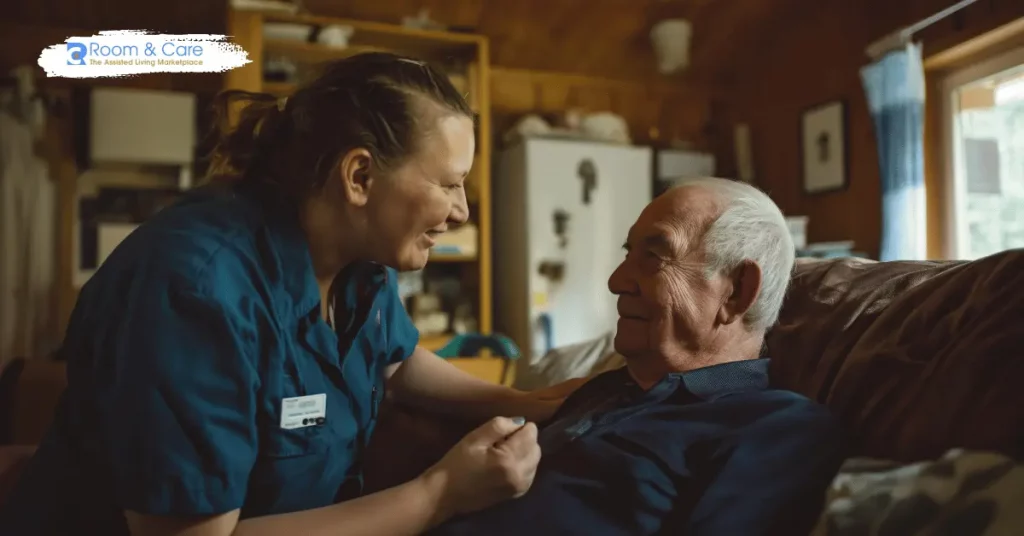

As veterans grow older, many face specific challenges related to their health, mobility, and emotional well-being due to their time in service. Whether they require assistance with daily living activities, medical care, or simply want to live in a supportive community, finding the right type of senior living environment can be a significant decision. Assisted living for veterans provides an opportunity for those who need help with daily tasks while maintaining a sense of independence. In this guide, we will explore the various types of senior living options available for veterans, including assisted living, independent living, and adult family homes. We’ll also discuss how to navigate the financial and benefit considerations, offering veterans and their families a detailed roadmap to finding the best care.
Veterans who have served their country often carry with them unique health conditions or emotional scars that can affect their day-to-day lives as they age. Conditions like PTSD, mobility issues, and chronic health problems related to military service can significantly impact a veteran’s ability to live independently. Assisted living facilities tailored to veterans’ needs offer specialized care, creating a supportive environment where they can thrive.
Assisted living provides a balance between independence and care, offering help with activities of daily living (ADLs) such as bathing, dressing, medication management, and meal preparation. Unlike nursing homes, which provide round-the-clock medical care, assisted living focuses more on providing personal assistance while allowing veterans to maintain their dignity and freedom.
Moreover, veterans can choose from a variety of senior living options, including independent living communities and adult family homes, which cater to different levels of need. Understanding the variety of choices is essential for making an informed decision about care.
Assisted living facilities are ideal for veterans who need help with personal care tasks but still want to maintain an active, social lifestyle. These communities provide a variety of services, including meals, housekeeping, transportation, and recreational activities, along with personal care assistance. The goal is to help residents stay as independent as possible while ensuring their safety and well-being.
Many assisted living facilities have programs designed specifically for veterans. These programs may include veteran recognition events, counseling services, and peer support groups, all of which can help foster a sense of community among veterans. In addition, some facilities work closely with the Department of Veterans Affairs (VA) to offer financial assistance to veterans, helping them manage the cost of care.
For veterans who are mostly independent but want the convenience and social engagement of a senior community, independent living is an excellent option. These communities offer housing in the form of apartments or cottages, along with amenities such as dining services, housekeeping, and recreational activities. Residents have access to on-site services as needed but are otherwise free to live independently.
Independent living is especially suitable for veterans who no longer want the burden of maintaining a home but don’t yet need the level of care provided in an assisted living facility. Many veterans find that independent living communities provide the perfect mix of freedom and support, allowing them to enjoy their retirement years without the stress of home maintenance or loneliness.
Veterans who prefer a more intimate, home-like setting may choose an adult family home. These homes are smaller residential care settings, typically housing between two to six residents. The smaller size allows for personalized care and attention, making it a great option for veterans who need assistance but prefer a quieter, more private environment.
Adult family homes offer all the services of assisted living facilities but in a smaller, more personalized environment. Veterans who may feel overwhelmed by larger communities often appreciate the close-knit, family-like atmosphere of these homes. Adult family homes also tend to be more affordable, making them an attractive option for veterans on a budget.

For many veterans, the cost of assisted living can be a significant concern. Fortunately, there are several financial assistance programs available specifically for veterans, which can help cover the costs of care. Understanding these options is critical for veterans and their families as they plan for long-term care.
One of the most valuable benefits available to veterans is the VA Aid and Attendance Benefit. This program provides additional financial assistance to veterans (and their spouses) who need help with activities of daily living. The Aid and Attendance Benefit can be used to cover the cost of assisted living, nursing homes, adult family homes, or even in-home care.
To qualify for this benefit, veterans must meet specific criteria, including having served at least 90 days of active duty with at least one day during a time of war, as well as requiring assistance with daily living tasks. The application process can be complex, involving medical documentation and financial records, but it can significantly reduce the financial burden of long-term care for eligible veterans.
Another excellent option for veterans is the network of State Veterans Homes, which provide long-term care to veterans at reduced costs. These homes offer various levels of care, including assisted living, nursing care, and memory care. While not all veterans may qualify for admission to a State Veterans Home, those who do can benefit from lower rates and a veteran-focused community.
Each state manages its own network of veterans homes, so the availability of services and admission criteria may vary. Veterans and their families should explore the options in their state to determine if this type of care is the right fit.
Veterans who do not qualify for VA benefits or who need additional financial assistance may consider long-term care insurance or Medicaid. Long-term care insurance policies vary in coverage, but they can help pay for assisted living, nursing home care, or in-home care, depending on the policy.
Medicaid, a state and federally funded program, is available to low-income individuals and can cover the cost of long-term care, including assisted living, in some states. However, Medicaid eligibility requirements and coverage options vary by state, so it’s important to consult with a financial advisor or elder law attorney to understand your options.
Choosing the right assisted living option for a veteran involves careful consideration of several factors. Here are some key elements to keep in mind when making this important decision:
The most critical factor in choosing an assisted living facility or other senior living option is determining the level of care the veteran needs. Veterans with minimal care requirements may be best suited to an independent living community, while those who need help with daily living tasks may benefit from an assisted living facility or adult family home. If the veteran has complex medical needs or requires round-the-clock supervision, a skilled nursing facility may be more appropriate.
When selecting a senior living community, consider its proximity to family members, VA hospitals, and other essential services. Veterans often appreciate being close to their families, allowing for regular visits and ongoing support. Additionally, proximity to VA hospitals or clinics can make it easier for veterans to access medical care and other VA services.
Many senior living communities offer programs specifically for veterans, such as recognition events, support groups, and counseling services. These programs can provide veterans with a sense of camaraderie and community, which is especially important for those who may feel isolated in their later years. When touring facilities, ask about any veteran-specific programs and services that may be available.
The cost of assisted living can vary significantly depending on the location, level of care, and type of facility. Veterans and their families should thoroughly research the costs associated with each option and determine what benefits or financial assistance may be available. For example, some facilities work directly with the VA to provide care at reduced rates or offer discounts to veterans.
At Room and Care, veterans and their families can filter facilities by those that accept VA benefits, helping streamline the search for affordable, high-quality care options. Additionally, since Room and Care eliminates the middleman, veterans can connect directly with care providers, ensuring a cost-effective and straightforward process.
When selecting an assisted living facility or adult family home, it’s essential to assess the quality of care provided. This includes the qualifications and experience of the staff, the staff-to-resident ratio, and the overall reputation of the community. Touring the facility and speaking with current residents and their families can provide valuable insights into the level of care and attention veterans can expect to receive.

What is the average cost of assisted living for veterans?
The cost of assisted living varies depending on the location, the level of care required, and the facility itself. On average, assisted living costs in the U.S. range from $4,000 to $5,000 per month. However, veterans may be eligible for VA benefits, such as the Aid and Attendance Benefit, which can help offset these costs.
Can veterans use VA benefits to pay for assisted living?
Yes, veterans can use the Aid and Attendance Benefit to help pay for assisted living, adult family homes, or in-home care. Veterans should consult with the VA or a veterans benefits advisor to determine eligibility and begin the application process.
How do I apply for the VA Aid and Attendance Benefit?
To apply for the Aid and Attendance Benefit, veterans must submit an application through the Department of Veterans Affairs. The application requires documentation of military service, financial information, and medical records showing the need for assistance with daily living activities.
What is the difference between assisted living and nursing homes?
Assisted living facilities provide personal care services, such as help with bathing, dressing, and medication management, but they do not offer the intensive medical care provided by nursing homes. Nursing homes are designed for individuals who require 24/7 medical supervision and care.
Finding the right senior living option for a veteran can be a challenging but rewarding process. Whether choosing assisted living, an adult family home, or an independent living community, the key is to consider the veteran’s unique needs, preferences, and financial situation. Veterans have access to a variety of benefits, including the VA Aid and Attendance Benefit, which can help cover the costs of care.
At Room and Care, we’re here to help you navigate the process. Our platform allows veterans and their families to find the best senior living options, including assisted living facilities, adult family homes, and independent living communities, all with no referral fees or middlemen. Veterans can easily filter facilities that accept VA benefits, ensuring they get the care they need without unnecessary complications.
Take the next step in securing quality care for the veteran in your life.